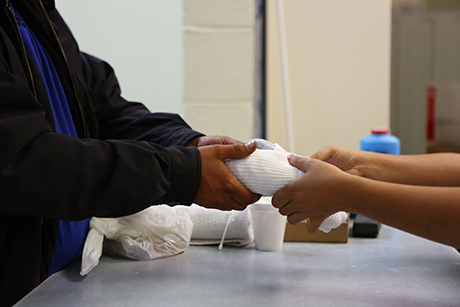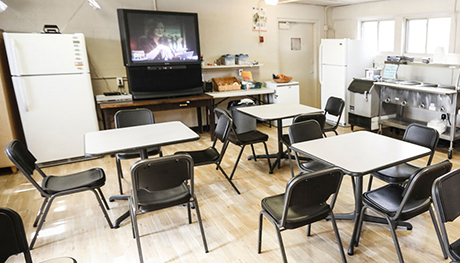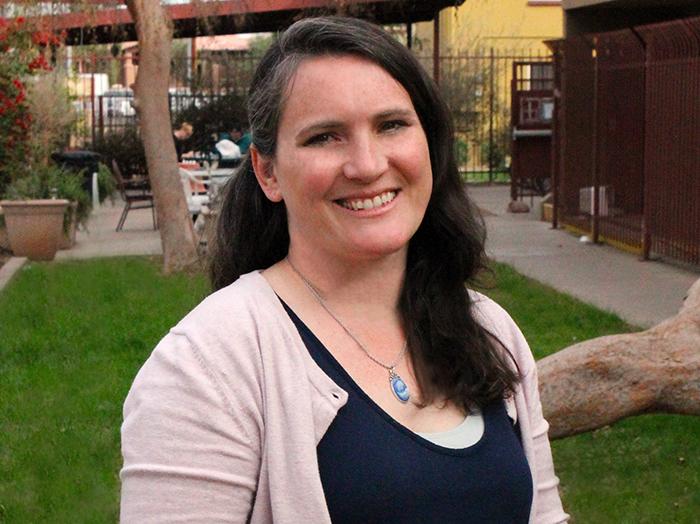On any given day Julia Matthies can be found at Ozanam Manor. As the new director of St. Vincent de Paul’s one-of-a-kind transitional shelter, Julia has found that the best way to learn the ropes of a new job is by diving in. While her job focuses on the day-to-day tasks of overseeing the shelter’s budget, making sure funding is available and supervising the clinical aspects of the shelter, she says her most important role is being what she calls the, ‘chief compassion officer.’”
“My whole goal is to make sure that the decisions we’re making for our clients about how we run things is just always by being compassionate and having that in mind. We’re not here to do a job; we’re here to serve people,” Julia said.
Ozanam Manor is a unique program that provides transitional, or “bridge,” housing to men and women who are over the age of 50 or have mental or physical disabilities. Ozanam Manor provides a safe space for these individuals to gather resources, find a job or seek family support during their time of need. Run by a team of nurturing case managers and mentors, Ozanam Manor offers a support system and pathway for individuals to get off the streets.

It was this support system that drew Julia to her new role with St. Vincent de Paul. Her entire career has focused on providing help to those who need it. Most recently, Julia worked as a clinical director for Terros. Prior to that, she worked in the social work department of the state hospital for over six years. But, Julia always felt the desire to go back and work with the homeless.
“I wanted to get back to working with people who are homeless,” Julia explains. “What I need in order to feel happy in my work is to be with clients, and I need to have the bigger picture in mind. So that’s what this does for me.”
Focusing on those in need is one of the main emphases of Ozanam Manor, and why it has been such a great success and help to those who able to take advantage of the shelter’s rotating door of help.
“We have 49 beds right now, going up to 60. What we do is basically take people off of the streets, or who are about to become homeless, and give them a safe place to live, to be and to call home while they are working on their permanent homes,” she said.

At Ozanam Manor, they understand getting back on one’s feet is no easy task, and are willing to accommodate for the time needed based on their goals. After all, the timeline for everyone is different and is based on their individual needs.
“We have a general idea for people when they come in” Julia said. “Most of them [Ozanam Manor residents] are applying for some sort of disability benefit which can sometimes take two years. Some of them are looking for work and that, in a lot of ways, is even more challenging, but we give them a home base to be because it’s really difficult to do those things if you’re living on the streets.”
No matter the time frame, Julia knows Ozanam Manor is not only unique for what they do for those people in need, but is also important for the community.
“I think we are the only transitional placement like this in the valley, meaning working with the elderly and the disabled folks. A lot of the transitional or bridge housing available is sober-living, or that type of thing. Also, a lot of them charge money. But we are to take people who are the most vulnerable. A lot of times, because they are older, they have a lot of health conditions and instead of living on the streets we’re able to give them a place where they can go to their doctor appointments, we can help them follow up, we can make sure their health is cared for, their safety is cared for, they have food and a roof over their heads and I don’t think there’s any other program doing that,” Julia said.

Ozanam Manor will soon be able to help even more people with the addition of the new building in downtown at St. Vincent de Paul’s Watkin’s campus.
“We’re looking forward to moving and becoming more integrated with the rest of the main campus downtown. It means we’re going to have 11 more people. We’re going to have space for helping 11 more people at a time. That’s really nice, and I really would like for it to mean that we have more opportunities for involvement from the community,” she said.
And Julia hopes that the community will want to be active participants at Ozanam Manor.
“That’s something I’m hoping we can improve; that connection to the larger community and keeping people coming back to volunteer. Some of our best volunteers were former residents. I hope to grow that as being a dynamic process of people coming in to work, meet with and get to know our residents. Then when our residents leave, we have them continue to work with us as mentors.”
For Julia, working with homeless people has been an important experience for her. She finds homeless individuals to be, in equal parts, resilient and vulnerable. She finds joy in each story her residents share, citing that there is so much potential in this population. During her short time at Ozanam Manor Julia has seen many successes, but she worries that if the community doesn’t help and protect those who are experiencing homelessness, those successes will disappear.
Julia’s mantra is one we can all live by. To her, love and faith are action words. She says, “I have to put my faith and my love into action. If I say that I love somebody, I have to make that decision every day and act that way. If I say that I believe in something and it’s my faith, then I have to act on it and I have to live my life that way.”
For Julia, working at Ozanam Manor allows her to connect, on a personal level, with the people in our community that need help. It’s this link that is so important for her. She needs it in order to keep fighting for ending homelessness, even if it’s just for one person at a time.
“We’re not called to sit on the couch and just idly love people. We’re called to go out and love people, and to me, I just needed to live my life in a way that put that into concrete action.”
Join us in welcoming Julia Matthies to St. Vincent de Paul.




